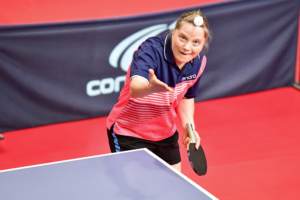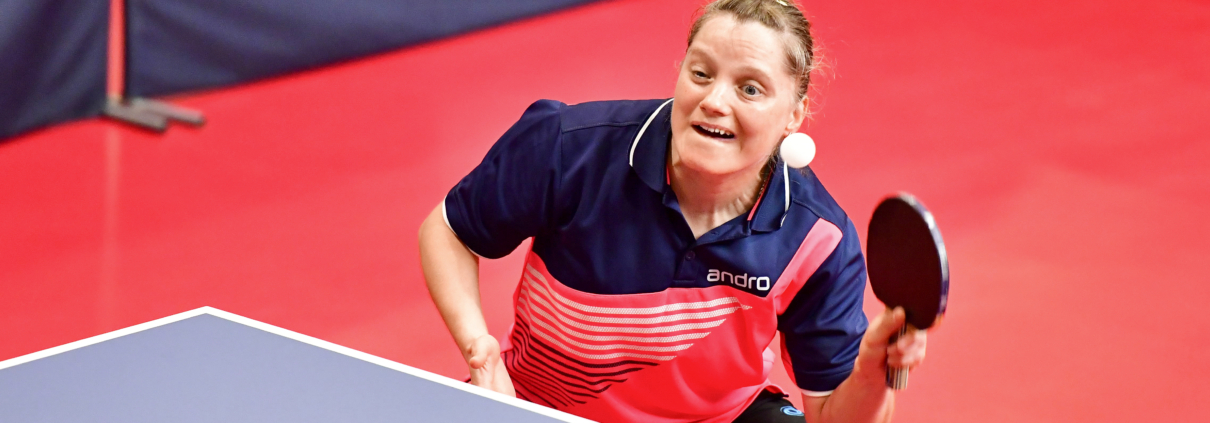Natalia Eyeing To Win Second Paralympic Gold From Paris 2024
Natalia Kosmina, a forty-one-year-old Ukrainian table tennis player is gearing up to win her second Paralympic Gold medal from Paris 2024. Natalia’s journey in sports began under unique circumstances. Living as an orphan, she found a new family in the Youth Sports School for People with Disabilities. Her biggest supporter is the very community that embraced her.
For Natalia, inspiration came from a friend who introduced her to the sport. Her role model, Bernadette Szocs, a distinguished Romanian table tennis player, has had a significant impact on her.
“She plays very competently and calmly. I look up to her,” Natalia says, highlighting the importance of having figures to emulate.

Natalia Komina at 2023 Virtus Global Games. Photo Credit: Luc Percival
Natalia’s journey is not without its challenges. Her intellectual impairment has shaped her life in profound ways, yet she views it as a positive force.
“Intellectual impairment has actually had a good impact on my life. It led me to sports,” she explains. The support from the National Paralympic Committee of Ukraine has been instrumental in her development.
“Playing table tennis gave me self-confidence and the opportunity to represent Ukraine on the international stage. It taught me that big goals are achieved through small steps and provided me with friends and good colleagues.” Natalia further added.
Natalia’s training regimen is rigorous. She trains twice a day, combining tennis-specific exercises with general physical workouts and focused serve practices.
“The most difficult thing for me was to adjust psychologically,” she admits.
Natalia received her international eligibility with Virtus in May 2016 which opened doors for her at the international elite para-sports competitions. The Rio 2016 gold medallist couldn’t make it to the semifinals at Tokyo 2020. However, with resilience and determination, Kosmina brushed off the dust and currently ranks 7th in the ITTF world ranking and is climbing her way up to the top slowly.
Natalia’s list of achievements is impressive including gold medals at the 2017 European Championships, bronze at the 2023 ITTF European Para Championships (both in Singles class 11 and Mixed doubles class 22), bronze at the 2019 European Championships, silver at the 2015 European Championships, and bronze at the 2014 World Championships, all in Singles class 11.
When asked about her favourite medal, she finds it hard to choose.
“Every medal holds a special place because each represents overcoming different challenges.”
Looking ahead, Natalia is gearing up for the Paris 2024 Paralympic Games. “I have a few competitors, representatives of Turkey, France, and Japan,” she notes, ready to face her rivals with determination.
Natalia’s ultimate goal in life is simple yet profound. “To be healthy, work, and start a family,” she states. Her message to young athletes with intellectual impairments is filled with encouragement.
“I wish young people to develop intellectually and psychologically and to be involved in various sports. Don’t give up on anything.”
Natalia Kosmina’s story is one of resilience, determination, and the transformative power of sports. From an orphan in Mykolaiv to a champion on the world stage, she embodies the spirit of perseverance and the belief that with hard work and support, anything is possible. As she continues to train and compete, Natalia remains an inspiration to many, proving that the human spirit can triumph over any obstacle.
Join Virtus’ #MakingInvisibleVISIBLE campaign in making Natalia’s journey Visible.
WHAT IS INTELLECTUAL IMPAIRMENT?
Intellectual impairment is an umbrella term to describe a vast and neuro-diverse group of people with varying types of cognitive impairments including intellectual disability, Down syndrome and autism. Having an intellectual impairment impacts how an athlete understands the rules of the sport, interacts with other players, and adjusts to different environments. They might find it difficult to manage reaction times, remember specific race or game strategies, retain focus for long period of time, or maintaining impulse control.




